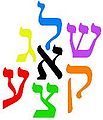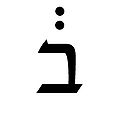 I first began my study of Hebrew in the fall of 1968, almost 50 years ago. I took the language in seminary precisely because it looked funny. That is no hyperbole! I went to a theological school because my wife of now 49 years told me while we were dating that she simply could not marry anyone who was not a Methodist minister. Since I had not been raised in any church, this statement caused me to perform serious surgery on my life’s plan. I had for years wanted to teach English in some college or other, and had no clue concerning what life as a minister of the church might be like. Later, Diana and I discovered that what she really meant by her statement is that she wanted to be a Methodist minister, but in 1966 models of female Methodist clergy were rare indeed. Because I hoped that she and I would marry (it worked!), I changed my college major and after graduation went to Perkins School of Theology in Dallas, TX, and took Hebrew for the very trivial reason I have above described.
I first began my study of Hebrew in the fall of 1968, almost 50 years ago. I took the language in seminary precisely because it looked funny. That is no hyperbole! I went to a theological school because my wife of now 49 years told me while we were dating that she simply could not marry anyone who was not a Methodist minister. Since I had not been raised in any church, this statement caused me to perform serious surgery on my life’s plan. I had for years wanted to teach English in some college or other, and had no clue concerning what life as a minister of the church might be like. Later, Diana and I discovered that what she really meant by her statement is that she wanted to be a Methodist minister, but in 1966 models of female Methodist clergy were rare indeed. Because I hoped that she and I would marry (it worked!), I changed my college major and after graduation went to Perkins School of Theology in Dallas, TX, and took Hebrew for the very trivial reason I have above described.
After barely a month with the language, I was hooked for life. I fell completely in love with the language itself, along with the history, theology, and culture that it presented. I was fortunate to be taught by a consummate Hebraist, who could not only read the language with ease, but could also demonstrate Hebrew’s very broad possibilities of meaning. It might be said like this: Hebrew is really quite easy when one begins its study but it becomes increasingly difficult the more one becomes aware of the amazingly wide meanings each word and phrase presents. For example, the prepositions in the language can be understood in about as many ways as one may conjure. In the famous commandment about not having any other gods (No.1 in Judaism but No.2 in most Christian traditions), the traditional translation reads : “you shall have no other gods before me” (NRSV, though a footnote provides an alternative reading “besides” Ex.20:2; Deut. 5:7). The Hebrew is the word ‘al, whose most common meaning is perhaps “against”. The preposition usually expresses motion or rest over or above something. Thus, the phrase might be read: “There must not be for you other gods over against my face.” That plainly is a rough translation and finally not completely illuminating.
However, when a parallel use of the preposition is examined from Gen.48:7, where Jacob describes the death of his beloved Rachel by saying, “Rachel died to my sorrow” or literally “against me”, Jacob is saying that Rachel’s death diminished him and brought to him pain and sadness. When this dimension of the word’s use is brought to the commandment, it may be said that YHWH is not merely angry when the people of Israel choose other gods; there is also a sense of divine diminishment, a terribly frustrating feeling of sorrow and loss. YHWH is literally less without the chosen ones whom YHWH first brought out of Egyptian bondage. Such a personal sense of divinity is a crucial aspect of the Israelite’s portrait of their God, and that insight appears only through the peculiarities of Hebrew.
I hope you can see my delight in this language from that example. It offers its readers a vast scope of imagination when a translator attempts to render the ancient words into modern English. The fact that classical Hebrew, confined almost completely to the Hebrew Bible, possesses only about 8,000 different words, while English, by comparison, contains over 1,000,000 different words, indicates something of the difficulties the ancient tongue throws into the translator’s face. Add to that simple enumeration the radically different grammatical structures presented by Hebrew and English. The former is Semitic with very simple, though wildly flexible, verb and sentence structures, while the latter has a complex verbal and sentence structure that are the banes of anyone who would learn the language, especially as a second tongue. English is thoroughly idiomatic in expression; I have been told that there are in English at least 1600 ways to say that someone is drunk! (Go ahead, and begin to explore the possibilities you know—not by getting drunk but by pooling the phrases that indicate that state!) But because Hebrew is a primitive language, no longer spoken in its classical form, its original meanings are not so easily captured, thus making translation into a modern language that much more difficult.
When I first began my study of Hebrew, I used the old grammar written by William Rainey Harper that presented Hebrew to its would-be readers by using Gen.1-8 as its introductory text. In other words, we began by learning the alphabet and then immediately began, however slowly and painfully, to study Hebrew grammar by reading the first chapters of Genesis. This wonderful inductive model was perfect for me, because I began in the language by reading some of its seminal texts right at the beginning, in fact “in beginning,” as Gen.1:1 inaugurates the Bible. As a result of this approach, I have the first chapters of Genesis nearly committed to memory, making them among my most beloved biblical texts even now.
As a result of this approach, I have the first chapters of Genesis nearly committed to memory, making them among my most beloved biblical texts even now.
In fact, I begin this Sunday (July 15) a three-week study of Gen.1-11 for the church we now attend. During the study, I will display by way of a simple Power Point my own translations of these chapters and will comment on those words and phrases that I think are the most interesting, problematic, and challenging in the familiar texts. In so doing, I hope to demonstrate both my love for this literature and the rich difficulties that they present to anyone who would attempt to plumb their bottomless depths. I can think of nothing I would rather do than share this amazing material with interested people who have perhaps long heard these texts, but have rarely if ever had the opportunity to study them with someone who has spent 50 years in their clutches. I can hardly wait for Sunday to come!
As a preacher, I have again and again and again gone back to the Hebrew texts for my sermons to refresh my thinking about a text that is perhaps overly familiar and as a result have nearly always discovered some fresh nugget of power that has been hiding in that text all along, awaiting my discovery. My ability to read Hebrew has immeasurably added to my preaching, its depth and richness, so today I celebrate Hebrew as a conduit of insight and wonder for anyone who would appropriate the Bible for a modern resource, either in pulpit or pew!
(Images from Wikimedia Commons)











